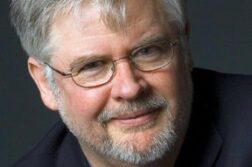LARRY MITCHELL helped clear the way for many of us, even if we didn’t know it. When I met Larry in 2008 to interview him for this magazine, we discovered that we had grown up thirty miles apart in Indiana (“It was a nightmare!” he exclaimed, and I agreed). Only after I made my way to graduate school in Indiana, and then to New York, and then onto the faculty of the College of Staten Island, CUNY, did I learn that I’d been following Larry around my whole life.
Thirty-five years apart, we had lived within a few blocks of each other in the St. George neighborhood of the forgotten borough.
Larry Mitchell, gay novelist and publisher, died of pancreatic cancer on December 26, 2012, in Ithaca, New York. With his lover Rick Morrison, Mitchell lived in New York City and Ithaca. He was 74.
Mitchell was best known for his unsentimental depictions of queer life in New York City’s Lower East Side and East Village in the 1980s and ’90s. His novels include The Terminal Bar (1982), In Heat (1986), My Life as a Mole and Other Stories (1988), which won a Lambda Literary Award, and Acid Snow (1993). His early The Faggots and Their Friends between Revolutions (1977), originally conceived as a children’s book and illustrated by Ned Asta, secured Mitchell’s reputation as a champion of radical queer life and politics. When neither straight nor gay presses would publish this book, Mitchell established his own press, Calamus Books, which specialized in gay male literature. It would be his most successful book, with three printings and 10,000 copies sold. He would go on to cofound the Gay Presses of New York. Mitchell’s other notable publications include Great Gay in the Morning: One Group’s Approach to Communal Living and Sexual Politics (1972) and the co-edited volume Willard W. Waller on the Family, Education, and War (1970).
Larry Mitchell was born in Muncie, Indiana, on July 12, 1938. He matriculated at Colby College in Waterville, Maine, in 1956 and moved to New York City in 1960 to attend graduate school at Columbia, where he earned a doctorate in sociology. In 1969, Mitchell joined the faculty at Richmond College and later moved to the College of Staten Island, where he taught sociology, sexual liberation, and feminism for the next 25 years. As part of the “25 to 6 Baking and Trucking Society,” a communal living and writing group in the St. George neighborhood of Staten Island, Mitchell found himself the subject of FBI surveillance: “For a year and a half they would steal our garbage. We had a lot of fun with them, because we weren’t doing anything. It was wild.”
At Columbia, he had been a student of the ways that power is exercised within culture, and this training would inform not only his thinking about gay liberation activism—he attended meetings of the Gay Liberation Front in the fall of 1969—but also his sociological approach to fiction. “I’m not a psychological writer,” Mitchell claimed. “I don’t really get into my characters’ psychology. I’m interested in their behavior, in what they say, in what they do. And New York gay culture was very much like that: here we are, let’s do it, what are we going to do?”
Ensconced on Second Avenue between Seventh and Eighth Street for much of the 1980s, Mitchell chronicled the behavior of the fellow gay revolutionaries, street kids, hourly laborers, addicts, and artists who made up his ever-shifting, ever-threatened community. His fiction defended against the dual threats of capitalism and assimilation, not only thematically but stylistically. Of In Heat, Boyd McDonald wrote, “it is a novel of rare purity, without a single fashionable line.” As AIDS decimated both his neighborhood and his readership, and due to his increasing blindness, Mitchell stopped writing in 1993. A distinctive literary voice, Mitchell remains a treasured historian of marginalized gay cultures.
Matt Brim is assistant professor of queer studies in the English Department at the College of Staten Island, CUNY.



